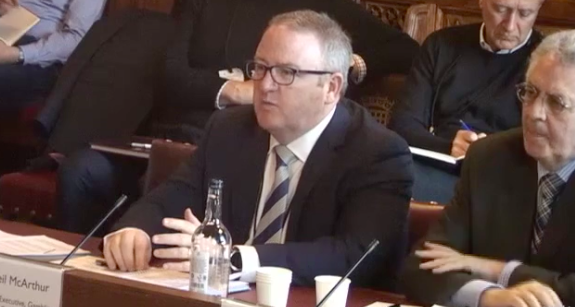Neil McArthur, Chief Executive of the UK Gambling Commission (UKGC), accompanied by Chairman Dr Bill Moyes, yesterday gave evidence to the House of Lords Select Committee investigating the ‘social and economic impact of the Gambling Industry’.
A two-hour hearing saw McArthur and Moyes detail industry intricacies and diverse social factors attached to regulating the UK gambling sector amid a backdrop of heightened political and media scrutiny.
Committee leader Lord Grade of Yarmouth began questioning by probing the legislative foundations of the 2005 Gambling Act, a framework implemented during the tenure of the ‘free market’ Blair government.
Fast-forward to 2020, Lord Grade questions whether ‘the Gambling Act now serves an anachronism as to how the UK gambling market has developed?’
Responding, Dr Moyes stated that although the Gambling Act maintains deficiencies, its legislation and core objectives “remain broadly relevant in making sure that gambling is safe and fair, vulnerable people are protected and at stopping crime getting a hold on gambling”.
“Mostly we still find that the legislation facilitates what we want to do,” he said. “The question of whether a government is right to promote gambling is more a matter of public policy rather than the legislation itself.”
Leading the UKGC, McArthur underlines that his team seek consistency in its regime of the UK gambling sector, referencing ‘constant touchpoints’ related to preventing gambling harms, stopping crime and whether gambling is conducted in a safe manner.
Consistency is deemed as the key dynamic for McArthur and his team having to “balance the consumer choice of an industry in which 24 million people gamble in the UK, against the fact that gambling harm is a problem for a significant number of people, 340,000 according to our latest statistics with a further 5 million marked as vulnerable”.
Backing Dr Moyes’ position, McArthur said that adhering to the Gambling Act’s legislative framework, the UKGC has been able to keep up with changing conditions “largely due to the power in allowing us to make licensing requirements and codes of practice addressing emerging issues”.
Lord Grade would move questioning onto media scepticism of the UKGC’s governance of the industry, highlighting significant publicity attached to ‘hard cases of problem gambling’, in which the UKGC had been criticised for ‘being reactive rather than pro-active’ with regards to its action plan.
Highlighting credit card wagering concerns brought-up by the BBC Panorama’ documentary on problem gambling, Lord Grade questions whether UKGC in-action are a consequence of policy limitations?
McArthur understands criticisms but underlines that concerns were recognised when the UKGC established its National Strategy broadening its all-round collective scope and corporate approach to tackling problem gambling issues and making the industry safer for consumers.
“The Strategy has been a much tougher approach to compliance and enforcement,” he added. “This was deliberate at changing the behaviour of operators since we had seen too many instances of failures being repeated.”
At an industry level, McArthur details that tougher enforcement has led to ‘behavioural changes’ needed within operators. However, the UKGC’s tougher stance would be ineffective without elevating awareness of gambling harm as a UK public health issue.
Marked as a key achievement, McArthur states “this was a very important moment for us, bringing together all the organisations with a part to play. The Commission, civic advisors, the NHS and operators had been finally been given a framework for addressing gambling-related harms”.
National Strategy initiatives to date have established a support structure in which the UKGC “has in place today more than 100 operators, technology providers and experts, looking at how we can use technology to better monitor consumer behaviour to keep them safe, and we should continue to accelerate this work”.
Lord Grade probed industry dynamics and whether the UKGC could keep up with the ‘clever people working in gambling, asking do you have the skillset to know what they are up to?’
McArthur responded by pointing to benefits of the National Strategy scheme supporting UKGC’s research and consumer advocacy, in which the regulator is able to enforce leadership to share knowledge and expertise on industry components.
“Through our policies we require operators to send us their people, compelling them to share knowledge and expertise on factors related to technology, product and product design,” he replied.
Industry technology developments are cross-referenced and reviewed by an independent panel of tech experts (non-industry related) to evaluate multiple factors related to consumer engagement, protection and ethics.
Following two-year since its implementation, McArthur continues to back the ‘three strands’ guiding the National Strategy in tougher enforcement, collaboration and innovation. He and Dr Moyes agree that the National Strategy has changed industry mindsets at a ‘boardroom level’, with new leadership dedicated to changing corporate cultures on tackling gambling harms.









